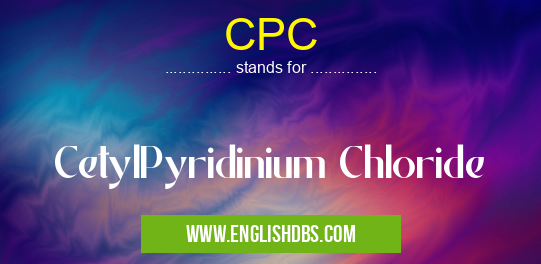What does CPC mean in DRUGS
Cetylpyridinium Chloride (CPC) is an organic compound that can have a wide variety of uses. It is a positively charged cationic quaternary ammonium compound, which makes it useful as a surfactant, preservative and antimicrobial agent.

CPC meaning in Drugs in Medical
CPC mostly used in an acronym Drugs in Category Medical that means CetylPyridinium Chloride
Shorthand: CPC,
Full Form: CetylPyridinium Chloride
For more information of "CetylPyridinium Chloride", see the section below.
Essential Questions and Answers on CetylPyridinium Chloride in "MEDICAL»DRUGS"
What is Cetylpyridinium Chloride?
Cetylpyridinium Chloride (CPC) is an organic compound that can have a wide variety of uses.
What are the uses of CPC?
CPC can be used as a surfactant, preservative and antimicrobial agent.
How does CPC work?
CPC is a positively charged cationic quaternary ammonium compound, which means that it has antibacterial properties and can help preserve products for longer periods of time.
What are some common applications of CPC?
Common applications for CPC include use as a preservative in food products, medicines and cosmetics; as an ingredient in detergents; and in cleaning products to kill bacteria and other microorganisms.
Is CPC safe to use?
Yes, it is generally considered safe to use when applied according to instructions provided by the manufacturer. However, it can be irritating to sensitive skin so it should always be used with caution.
Final Words:
In conclusion, Cetylpyridinium Chloride (CPC) is an organic compound with several uses including as a surfactant, preservative and antimicrobial agent. It has antibacterial properties and can help preserve products for longer periods of time when used correctly. It is generally considered safe but should always be applied with caution to avoid irritation or other skin reactions.
CPC also stands for: |
|
| All stands for CPC |
